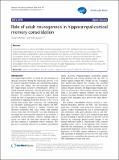Role of adult neurogenesis in hippocampal-cortical memory consolidation
Author(s)
Kitamura, Takashi; Inokuchi, Kaoru
Download1756-6606-7-13.pdf (507.0Kb)
PUBLISHER_CC
Publisher with Creative Commons License
Creative Commons Attribution
Terms of use
Metadata
Show full item recordAbstract
Acquired memory is initially dependent on the hippocampus (HPC) for permanent memory formation. This hippocampal dependency of memory recall progressively decays with time, a process that is associated with a gradual increase in dependency upon cortical structures. This process is commonly referred to as systems consolidation theory. In this paper, we first review how memory becomes hippocampal dependent to cortical dependent with an emphasis on the interactions that occur between the HPC and cortex during systems consolidation. We also review the mechanisms underlying the gradual decay of HPC dependency during systems consolidation from the perspective of memory erasures by adult hippocampal neurogenesis. Finally, we discuss the relationship between systems consolidation and memory precision.
Date issued
2014-02Department
Massachusetts Institute of Technology. Department of Biology; Massachusetts Institute of Technology. Department of Brain and Cognitive Sciences; Picower Institute for Learning and Memory; RIKEN-MIT Center for Neural Circuit GeneticsJournal
Molecular Brain
Publisher
BioMed Central Ltd
Citation
Kitamura, Takashi, and Kaoru Inokuchi. “Role of Adult Neurogenesis in Hippocampal-Cortical Memory Consolidation.” Molecular Brain 7.1 (2014): 13.
Version: Final published version
ISSN
1756-6606